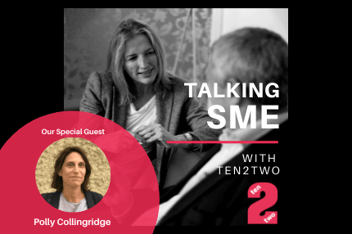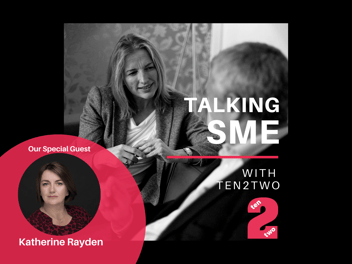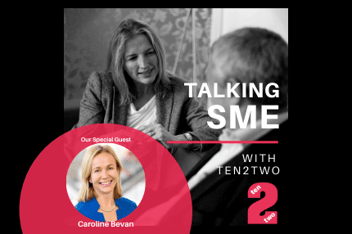Talking SME Podcast: Mental Wellbeing, More Important Than Ever
We’re delighted to welcome Kathryn Wellum-Kent to this episode of our Talking SME Podcast. This episode focuses on mental wellbeing, particularly for employees.
A bit about Kathryn
In this episode we chat to Kathryn Wellum-Kent, Director based in the Swindon and Bath offices of independent firm of chartered accountants MHA Monahans. She manages a portfolio of clients, helping them to balance their existing commercial needs with their future aspirations. Kathryn joined MHA Monahans in 2018, having spent 16 years working at one of the Big Four accountancy firms, where she principally focused on technology and business service companies.
We talk to Kat about mental wellbeing, and some of the initiatives that have been put in place at MHA Monahans to ensure the mental wellbeing of employees.
Click here to find out how Ten2Two can help your business survive and thrive.
Don’t forget to check out our other Talking SME Podcasts here.
‘Mental Wellbeing, More Important Than Ever’ is just one in our series of podcasts where we talk about a wide range of topics. We talk with business experts, and also offer broad insights to help SMEs become more successful.
Transcript
[00:00:02.840] – Tracey AdamsHello and welcome to Talking SME, our quick chat with business leaders. I’m Tracy Adams, and today I’m pleased to welcome of Kat, Director of Business Services at Monahans, a leading independent firm of chartered accountants and commercial advisors. Welcome Kat. [00:00:23.230] – Katherine Wellum-Kent
Hi, nice to be here. Thank you. [00:00:28.220] – Tracey Adams
So we’re going to be talking about mental health. Without a doubt, one of the most talked about subjects and areas of concern for the business community at the moment. And having kept in touch with you throughout the pandemic, it’s been interesting to hear about the positive attitude that MHA Monahans has towards its employees. So I thought this would be a good opportunity to discuss, talk about and for you to perhaps share your thoughts and best practice in this area. [00:01:02.610] – Tracey Adams
So that sounds alright with you. Let’s go with the first question. So why is mental health sorry, mental well-being of employees important to you at MHA Monahans. [00:01:16.660] – Katherine Wellum-Kent
Well, I think so you mentioned we’re a independent firm of accountants and I think across our offices we’ve probably got about two hundred people – a decent sized number, but we still feel very much like a small firm, kind of like a family kind of culture. So I guess part of it is we’re friends with our colleagues. [00:01:40.090] – Katherine Wellum-Kent
So it’s important that our friends or colleagues are doing well and we kind of support them where we where we need to. But kind of thinking on a broader level of MHA Monahans as a firm, why is it important to the firm … our people are our best assets. They’re the people that provide the kind of the quality advice and services to our clients. So for us to achieve what we want to in terms of quality, delivery of advice to our clients, we need them to be operating at their best. [00:02:16.270] – Katherine Wellum-Kent
And that only happens when they are in a happy place where they’re enjoying work, where they feel supported, where they’re not stressed, where they’ve kind of got that great team culture, so that’s why it’s such a big focus for us. And I think over the course of the pandemic, it’s been really difficult to to keep that going. Employees have often been at home, so it’s kind of quite isolating. They don’t have that support of the team and it’s very easy to to blur boundaries. [00:02:50.890] – Katherine Wellum-Kent
So you’re working and living in the same place. Work creeps into home. Home creeps into work. You don’t get that period of switching off. It’s been a challenge that we’ve been very conscious of, that we wanted to help and support our team members on because it is a business issue. It’s something that does impact our goals and objectives as a business. I think before the pandemic, people we kind of thought of it as oh mental well-being or mental health and all those kind of things – it’s a nice to have, it’s a tick in the box that helps us make, like, think we’re a good employer, it’s something HR deals with. But I think it’s definitely becoming more mainstream. We need to get this right for us to operate effectively as a business. [00:03:39.460] – Tracey Adams
Yeah. Yeah, absolutely. I think that’s completely the right thing to say, it’s become so much more than a tick in the box now. And obviously, as you said, managing employees’ mental wellbeing throughout the pandemic would have been even more critical and put it right at the top of the list. So what additional practical steps have you taken as a business to ensure employees feel supported? [00:04:04.550] – Katherine Wellum-Kent
So I think that the thing that we identified straight off was most of our employees, we had we had everyone in offices, we were working as teams. So when we went into lockdown and had people working at home, the thing that we were missing is when we were in the office, if we could, we could get early warning signs if people were starting to struggle if they had an issue with things. And that really became a lot more opaque when people were sitting at home and we weren’t seeing them. So more regular check ins. So we were trying to have regular catch-ups on zoom, Teams, Skype, whatever technology you want to use. [00:04:47.990] – Katherine Wellum-Kent
We also had a structure where one line manager was looking after a lot of staff, so it was very difficult for them to to keep in contact with all of them on a regular basis just to make sure everyone was doing OK. So we gave responsibility to some of our more experienced team members to look after some of the more junior members of the team so that you were creating kind of almost like little mini pods to keep those check ins going. [00:05:18.330] – Katherine Wellum-Kent
And it also meant then when issues came up, then that was easier to provide kind of that support that they might need. So that’s a big thing that we did. [00:05:28.880] – Katherine Wellum-Kent
And we also did your usual kind of like try to keep the team atmosphere going. So we had WhatsApp groups and we had pub quizzes and online events, things like that. One of the things that I thought I found most useful is we’ve started doing a weekly newsletter. So that goes out to everyone in the firm. And it’s an opportunity to share what people have been up to, celebrate birthdays, celebrate successes, people to say thank you to other people and kind of show what other people have done to support people and how appreciated it is. [00:06:10.010] – Katherine Wellum-Kent
And it’s also got a lot of kind of like top tips about things that might be challenging. So mental health or getting out and doing exercise or podcasts or recipes or when we were home schooling, how to manage home schooling or school holiday activities, but all in a kind of really fun way and I think it shows that we as a firm understand some of the challenges that our employees are facing, both in and outside of work and trying to provide some kind of resources to help them get through it as best as best they can. [00:06:51.290] – Katherine Wellum-Kent
So that newsletter, I think has been been really good. And we’ve also just upped the training that we’re doing around mental health and mental wellbeing. So especially for people with managerial responsibility, giving them the tools to spot issues and what to do when when issues might arise. [00:07:14.270] – Tracey Adams
Fantastic. That is so wide ranging. Some great advice there thank you. What positive impact have you seen from these steps that you’ve taken around employee well-being? And do you think this has helped the business? [00:07:33.560] – Katherine Wellum-Kent
I definitely think it’s helped the business, I think it’s difficult to to say anything really tangible because so much has happened over the time that any kind of improvements or not is difficult to gauge because we’re in a different world. [00:07:47.970] – Katherine Wellum-Kent
But we do an annual employment engagement survey and the results of we did one over the summer and that was really positive in terms of the engagement scores and what people were feeling about the support, which was really encouraging. And as a people based business, one of our key metrics that we look at is how kind of busy our people are and kind of delivering that service to clients. And those kind of stats have held up and doing really well. [00:08:23.820] – Katherine Wellum-Kent
But I think, anecdotally, some of the things that I’ve spotted over the course of the last 12 months is that when people are starting to have issues or struggles around kind of maybe juggling a bit too much work or getting stressed and things like that, I think people are flagging that to their managers earlier on, which is just brilliant. Because it then allows us to provide that support and work with them to figure out how we can how we can help them to get through it, whether that’s moving some work around or giving them some extra training or support or whatever it is. [00:09:04.420] – Katherine Wellum-Kent
And it just means that we can kind of get on top of the problem, rather than it gets to like almost a much more extreme perspective where someone has to go off work for a couple of weeks or whatever it is. But it’s that people are talking about it more. And I think that is that is really positive. And that is a big help to us running the business, because then we can respond. [00:09:31.120] – Tracey Adams
Absolutely. That is a really good culture, a fantastic culture you’ve created. So looking at it from the point of view of a candidate or future employee, what advice would you give to candidates seeking out new employment? What sort of research do you think they should be doing about a company? What questions should they be asking at interview? With employee well-being being so high on the agenda. [00:09:58.490] – Katherine Wellum-Kent
Yeah, I think it’s important to to kind of get into it a little bit more, because I think it’s easy for people to say that they’ve got these programs and things, but it’s got to be, for an employee to feel and see the benefits of it, it’s got to actually be embedded in the culture and actually what is done on a day to day basis. I guess some of the things that I would probably do is maybe kind of follow the company on LinkedIn or follow some of their employees to see about the sorts of things that they are talking about. [00:10:32.230] – Katherine Wellum-Kent
Because if it’s all very business, business, business and not much about their people, then that probably says something about their priorities. I’d definitely ask some questions in the interview about what they do to kind of support their employees on the kind of well-being, and I would ask some follow up questions to actually understand what happens in practice. Like how does that, what benefits have you seen, how have you seen that working, to kind of get to actually, I guess, challenge them a bit to see whether they’ve just got it just for the sake of it or whether it actually means something? [00:11:15.380] – Katherine Wellum-Kent
Or also one of the things that we do, especially with our associate intake, so school leavers or graduates, we give them an opportunity to have a chat with some of our existing staff to kind of just ask them these kind of things and so they can get a better feel for the business. And I think that’s a great way of actually finding out what what it really is like to work there. [00:11:40.760] – Tracey Adams
Brilliant, thank you. And one final thought. Is there a particular initiative that you feel really helped your staff through the pandemic? Maybe one you’re really proud of at MHA Monahans. [00:11:54.790] – Katherine Wellum-Kent
It’s difficult to pinpoint a particular thing, but, for me, I think that there has been a shift in the overall perception of flexible working and, don’t get me wrong, Monahan’s before the pandemic, we had quite a lot of people that were working kind of flexibly like part-time and things. But I think that’s been taken one step further during the pandemic because we have seen that people can work from home, people can work flexible hours to fit in around other commitments so like if you’re home schooling, we’ve seen that you don’t need to be based in a particular office to deliver a role. You could be actually in the Swindon office doing something for the Trowbridge office, for example.
So it’s just demonstrated that I think there’s more flexibility. And now we’re starting to see that come through in terms of when we’re looking at roles or opportunities where as before, we’d have been like, OK, that person has to be based in Swindon. It’s easier for us to be actually, they don’t need to be in Swindon and they need to spend a bit of time there when we’re all open up to get to know the people, but actually, they could be based in another office or somewhere else. They could be kind of fitting in like 20 hours over the course of a week and as long as they manage that with their line manager, it doesn’t really matter when it falls, as long as people know when it’s being done.
[00:13:39.310] – Katherine Wellum-KentSo it’s just taken that mindset around flexibility that step further, which I think then is great for candidates. But it’s great for us as a business because it gives us a greater pool of candidates and people that we can work with, who maybe have got all the skills. Beforehand we might have discounted them for one reason because they didn’t or couldn’t do exactly what we were after. I think it’s just opened that up. And that will be really interesting because it will allow us as a firm to grow with better people. [00:14:10.580] – Tracey Adams
As you know, that’s absolute music to my ears, I’m dancing around the room here, because it’s brilliant to have a business say that. So that’s so good to hear. Brilliant. Thank you ever so much Kat. That’s the end of my questions, but that’s all brilliant advice. So thank you so much for joining us today. It’s been an absolute pleasure to talk to you. [00:14:36.860] – Tracey Adams
And to all the listeners, I hope you’ve enjoyed Talking SME and look out for future episodes coming soon. [00:14:44.930] – Tracey Adams
Thanks. Thanks. Bye.


 Back to resources
Back to resources 14 min read
14 min read








